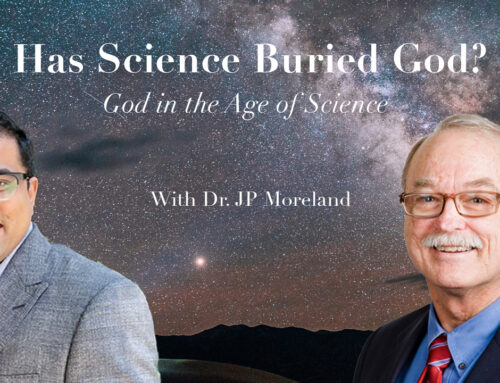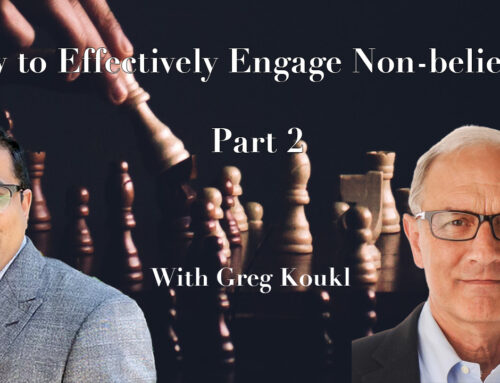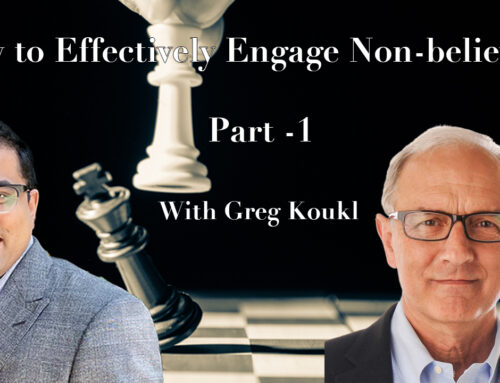We’ve all met someone who disbelieves in supernatural things because they’re more “science minded”, as though science has disproven the supernatural entirely. In this episode we look at the scientific reasoning against miracles, to see whether this debate really has been settled by the scientific process.
Music from www.bensound.com.Photo by Louis Reed on Unsplash
Audio of the Ultimate Questions Podcast is found anywhere podcasts are available.
Transcript:
Hello, and welcome once again to the Ultimate Questions podcast.
Last episode we began looking at scientific arguments against the possibility of miracles. For the most part, what we looked at in that episode was bad examples of miracle claims. This is like when people say God gave them a parking space, or when someone gets better through medical intervention, or when people just can’t explain things, and they attribute all of these to the supernatural actions of God, which we would call miracles. The basic point was that, even if there are bad examples of miracle stories, that doesn’t delegitimize stronger cases of miracle claims, and the evidence is still worth considering. For today’s episode, we’re going to look at how skeptics claim that the scientific process somehow defeats any concept of God or the miraculous.
To begin, there’s a very popular objection against miracles that the skeptics of our day use quite often. This is the popular quote, “extraordinary claims require extraordinary evidence”, given by the late popular scientist, Carl Sagan. As such, this is sometimes referred to as the “Sagan Standard”. The basic idea here is that skeptics would claim that any time we give some sort of incredibly outrageous claim, we need to back it up with evidence that is as powerful as the claim is outrageous. At first glance, this seems like a very reasonable response, however, I would argue we basically never apply this type of standard to anything, and even if we do, I think it ends up committing another fallacy. So firstly, we never apply this standard to anything in life. For example, if someone wins the lottery, this is an extraordinary claim. You’re telling me, out of all the millions of people that paid into the lottery, that you’re the winner? The odds of that are literally millions to one. If you’re going to prove that to me, you need to have some equally extraordinary evidence. Oh, a tiny piece of paper with some numbers on it? Here’s your money! The winning lotto ticket is not a very extraordinary piece of evidence, and yet, it is sufficient. Yes, it is a fact you won the lottery, but the evidence to prove that fact is quite mundane, just a little piece of paper. You have an improbable claim, yet this tiny piece of evidence is quite sufficient to prove your claim.
Here’s another case. Suppose for a moment a random person came running out of the woods screaming, claiming there are aliens fixing a broken-down UFO in the middle of the woods. You would naturally think he was nuts. However, suppose another couple of people come running out of the woods, saying the same thing. All of a sudden you’re actually considering the possibility of aliens and a UFO in the woods. Was there any extraordinary evidence? You only had one piece of very unimpressive evidence, but then you received another case of this evidence, of the very same type, and now you’re seeing the claim as worthy of being considered? What if you then heard a loud metallic clunking sound. You’d probably assume it was the UFO, rather than any of the many other possible explanations. At this point, you’re actually considering something more extraordinary than anything that has ever happened to humanity, and you’re considering it because of very little evidence. I would think, given the interests of Carl Sagan, that Sagan himself would gleefully go running into the woods in hopes of seeing some little green men. In these sorts of cases we notice that extraordinary claims do not require extraordinary evidence, instead, I would argue that any claim requires sufficient evidence. It doesn’t matter whether the claim is mundane or extraordinary; if it has enough evidence to give us cause to believe it, then it’s worth believing. There are times where a very extraordinary claim requires only a very small amount of evidence, because the evidence works so strongly in its favor. There are other times where a very simple claim requires quite a lot of evidence, because the evidence can work in favor of multiple views. In this way, saying extraordinary claims require extraordinary evidence just isn’t practical.
There’s a worse problem for this “Sagan Standard”, which is that, in practice, it’s an excuse for the skeptic to argue fallaciously. In every case I’ve had someone use this objection against a miraculous claim, I have given them evidence to back up the miraculous claim. Upon hearing my evidence, they don’t actually handle the evidence, or give another explanation, or reason in any way; instead, they merely demand more evidence, or dismiss the evidence I’ve given them as being inadequate. If they dismiss the evidence, then this is a classic case of confirmation bias, which means that they’ll only accept evidence that supports what they already believe. If they demand more evidence, then this is another fallacy called the “moving the goalposts” fallacy. In this situation, no matter how strongly a person argues their case, the skeptic will merely demand more evidence, and will never be satisfied. It’s incredibly easy to sit back, and simply demand more and more evidence. The hard part in this sort of discussion is to actually reason through the points, and deal with the evidence. As an example, I’ve argued about the existence of God with many atheists and agnostics. I’ve had many cases where the skeptical person will demand an argument for God’s existence, to which I then give them an argument. Instead of countering my argument, or dealing with my evidence, they merely say, “well that’s not good enough, I need more if I’m going to believe”. So I give them another argument. Again, they don’t handle the argument at all, they do nothing to deal with the evidence, and they simply demand more evidence. So I give them more evidence, and again, they just demand more. Here, it becomes obvious very quickly, that it doesn’t matter how much evidence I give them; they have made up their mind, they are not going to consider my position, they aren’t going to reason through arguments with me, and they’re not going to handle the evidence I provide. This is how fallacious reasoning works. In this way, the idea of “extraordinary claims require extraordinary evidence” sounds very reasonable at first glance, but in practice, it ends up being impossible to live out, and even fallacious.
In this sort of discussion about whether miracles are possible, or whether the supernatural exists, one of the big ideas is that, somehow, science says that there is no God, or that miracles are impossible. A common complaint against the resurrection argument we’ve been going through is that, dead men stay dead. The real question lingering behind this is this: how exactly has science shown us that there is no supernatural element to the world? By its very nature, science works through a process called “induction”, which means that we gather a bunch of examples of some phenomena, and then find the commonalities among them. We then try to infer natural laws and explanations that will cause these commonalities. So, for example, if we get millions of cases where water boils at 100 degrees, we then infer that heating up water causes it to boil. This is how the scientific process works; we gather a bunch of examples, and through inductive reasoning we infer some naturalistic law that causes things to work the way that they do. So, when the skeptic says “dead men stay dead”, what they’re really saying is that, in all the cases we’ve seen death, it’s permanent. However, I think this entirely misses the point of what miracles are, and actually proves my point, that science cannot inform us on such matters. A miracle is a unique event, something that falls outside of the natural order of things, and is caused by some supernatural agent. By its very nature, a miracle is not going to be repeatable, so we won’t have many examples, which is required in the scientific process. Science cannot inform us on events like these, because it’s outside of the ability of inductive reasoning, which is how science operates. Science isn’t capable of arriving at a negative conclusion that miracles are impossible. I mean, what would that even look like? Would it be that, we have lots of examples where miracles didn’t happen, therefore miracles must never happen at all? That’s an awfully silly way to reason. Imagine for a moment I said, we have many examples of trees not growing fruit, therefore, no trees grow fruit. Surely you’d tell me there’s been a fatal flaw in my reasoning, so too we find that with this argument trying to say science disproves miracles. You cannot reason from a lack of examples of an event to inferring that it is impossible.
Another problem with this idea that science disproves miracles is that miracles are very different from natural events, in that miracles are caused by an agent. What I mean by this is that, by definition, a miracle is not something that happens naturally, but instead, is directly caused by the intervention of some kind of supernatural entity. We’re not making the claim that, “sometimes people do happen to rise from the dead”. No, what we’re claiming is that the resurrection of Jesus Christ was a unique event, that was directly caused by God, and could not have happened naturally. That’s why it’s a miracle. The fact that there is a person involved, who is causing the effect, is of vital importance to the nature of a miracle. As an example, gravity pulls things towards the ground. So, if I drop this ball, it will naturally fall to the earth. You could say something like, “balls that are falling stay falling until they hit the ground”, because, naturalistically, this is how things work. However, we have a problem; what if I intervene? I, as an agent, have causal power over the ball. If I intervene, I can stop the ball, or even hit it back upwards. You cannot predict this using science, because science only describes the natural laws that explain how things “naturally” play out. However, here we’re not just looking at how things naturally play out; we’re also looking at the intentional action of an agent interfering with the natural course of events. No one is arguing that resurrections “just happen”, or that healing “just happens” now and then. We’re not looking at natural explanations, we’re looking at supernatural explanations, which infers an agent, like God, intervening. If anything, we should expect that science could never, even possibly, ever inform us about miracles. That’s to be expected, since it’s beyond the power of inductive reasoning, because looking at a bunch of examples will never be a satisfactory way of evaluating what sorts of actions people will choose to perform.
A last way that skeptics will try and appeal to science to explain away miracles is that they will claim that science can explain literally everything, and is the best, or even the only, way to understand the world. This kind of thinking is at times referred to as “scientism”. It’s a way of understanding how we know things, which is called “epistemology”. Epistemology is a field of philosophy that studies how we learn, how we have knowledge, and even what knowledge is. On scientism, the only good way to learn or know anything is by science. So on this view, if something is truly beyond the realm of science, then it’s impossible to know. We’ll go further into this view much later in this podcast, when we start dealing with all the scientific parts of apologetics, but for now, for our purposes, this kind of mentality ends up treating miracles as if they will certainly have a natural explanation. This is quite problematic, once you think about it, because once again it’s committing the fallacy of begging the question, or circular reasoning. If we’re discussing the likelihood of miracles, and the skeptic says that everything has a natural explanation, then the skeptic is presuming naturalism before even beginning the conversation. Naturalism is the philosophy that everything is natural, and there are no elements of the supernatural in all of the universe. So, if everything is natural, then there couldn’t be anything supernatural, and thus, no miracles. If the skeptic presumes naturalism, without argument, before even evaluating the evidence, then they are begging the question in favor of their position. Miracles aren’t even considered, even though that’s the thing we’re supposed to be debating! A good example of this is found in H.G. Wells early work, “The Wonderful Visit”. In this novel, an angel descends into our world, and is found by a man. At one point, the man presents the angel to a doctor. The doctor then observes the angel, with his glowing face, and magnificent wings, and is barely even surprised. He gives naturalistic explanations for everything, seeing the wings as odd protrusions caused by mutation, and even recommends the angel have him saw them off. He thinks it’s just a strange deformation, with some of our ancient avian genetics resurfacing themselves. The doctor even mocks the man, and the angel, for actually thinking this might be a real angel. By the end of the conversation, the man who found the angel is even half convinced that he must not really be an angel after all. In the doctor’s mind, anything and everything, no matter how miraculous, must have a natural explanation, because the natural is all that there is, and so science can account for literally everything. In this case, the doctor’s philosophical view of scientism is holding him back from being able to appreciate the evidence, and come to the truth, that this actually is an angel. H.G. Wells is considered the father of science fiction, and was quite a fan of science, and wasn’t at all trying to delegitimize science, but it is interesting that he still noticed this aspect of humanity where we defer to naturalistic explanations, even in his day, which was over a hundred years ago. The point being that, when the skeptic delegitimizes anything miraculous, as though science has done away with such things, they are always falling prey to some kind of fallacious reasoning. As we’ve seen in this episode, they either commit circular reasoning, have confirmation bias, or move the goalposts, all of which are irrational and illogical forms of reasoning. The better way of going about the argumentation would be to actually handle the evidence, and evaluate what the best explanation of the data is. The mere fact that some explanation is miraculous does not delegitimize it, and so the resurrection should still be considered in light of the evidence, rather than dismissing the notion, simply because it’s supernatural.
Next week, we will look at the person who has probably done more for the skeptical position against miracles than anyone else who has ever lived: David Hume. Many scholars consider Hume to have been the greatest anti-supernaturalist the world has ever seen, and that his work against miracles disproved miracles entirely. So I hope you’ll join me next time, as we look at David Hume’s arguments against miracles, here on the Ultimate Questions Podcast.




